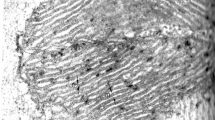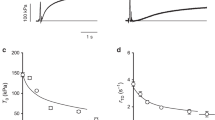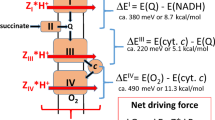Abstract
IN perfused rat heart, glycolysis is accelerated by anoxia and uncouplers of respiratory chain phosphorylation and inhibited by the respiration of fatty acids, ketone bodies and pyruvate1–4. Measurements of the concentrations of hexose phosphates have led to the suggestion that these agents change the rate of glycolysis by altering the rate of the phosphofructokinase step1–3. The rates of glycolysis and of the phosphofructokinase reaction are also diminished in hearts from alloxan diabetic or starved rats in which the release of fatty acids from glycerides for oxidation is enhanced4,5. In extracts of guinea pig heart6 and of rabbit skeletal muscle7 the activity of phosphofructokinase is inhibited by increasing concentrations of ATP and stimulated by increasing concentrations of 5′ AMP, cyclic 3′,5′ AMP, ADP and inorganic phosphate. These observations suggest that anoxia and uncouplers of respiratory chain phosphorylation increase the rate of the phosphofructokinase reaction in muscle (and hence of glycolysis) by increasing the concentrations of 5′ AMP, ADP and inorganic phosphate and diminishing that of ATP.
This is a preview of subscription content, access via your institution
Access options
Subscribe to this journal
Receive 51 print issues and online access
$199.00 per year
only $3.90 per issue
Buy this article
- Purchase on Springer Link
- Instant access to full article PDF
Prices may be subject to local taxes which are calculated during checkout
Similar content being viewed by others
References
Newsholme, E. A., and Randle, P. J., Biochem. J., 80, 655 (1961).
Newsholme, E. A., and Randle, P. J., Biochem. J., 83, 387 (1962).
Newsholme, E. A., Randle, P. J., and Manchester, K. L., Nature, 193, 270 (1962).
Randle, P. J., Garland, P. B., Hales, C. N., and Newsholme, E. A., Lancet, i, 785 (1963).
Garland, P. B., and Randle, P. J., Nature, 199, 381 (1963).
Mansour, T. E., Clague, M. E., and Bearnink, K. D., Fed. Proc., 21, 238 (1962).
Passonneau, J. V., and Lowry, O. H., Biochem. Biophys. Res. Comm., 7, 10 (1962).
Wakil, S. J., and Hubscher, G. J., J. Biol. Chem., 235, 1554 (1960).
Garland, P. B., and Tubbs, P. K., Biochem. J. (in the press).
Wieland, O., and Weiss, L., Biochem. Biophys. Res. Comm., 10, 338 (1963).
Bücher, Th., Z. Naturforsch., 8, b, 555 (1953).
Morrison, J. F., Biochem. J., 56, 99 (1954).
Dagley, S., in Methods of Enzymatic Analysis, edit. by Berfmeyer, H. U., 313 (Verleg Chemie, 1963).
Author information
Authors and Affiliations
Rights and permissions
About this article
Cite this article
GARLAND, P., RANDLE, P. & NEWSHOLME, E. Citrate as an Intermediary in the Inhibition of Phosphofructokinase in Rat Heart Muscle by Fatty Acids, Ketone Bodies, Pyruvate, Diabetes and Starvation. Nature 200, 169–170 (1963). https://doi.org/10.1038/200169a0
Issue Date:
DOI: https://doi.org/10.1038/200169a0
This article is cited by
-
Enriched functional milk fat ameliorates glucose intolerance and triacylglycerol accumulation in skeletal muscle of rats fed high-fat diets
European Journal of Nutrition (2023)
-
Metabolic reprogramming by Acly inhibition using SB-204990 alters glucoregulation and modulates molecular mechanisms associated with aging
Communications Biology (2023)
-
Circulating metabolite homeostasis achieved through mass action
Nature Metabolism (2022)
-
Exogenous Ketone Supplements in Athletic Contexts: Past, Present, and Future
Sports Medicine (2022)
-
Metabolomics and the pig model reveal aberrant cardiac energy metabolism in metabolic syndrome
Scientific Reports (2020)
Comments
By submitting a comment you agree to abide by our Terms and Community Guidelines. If you find something abusive or that does not comply with our terms or guidelines please flag it as inappropriate.



